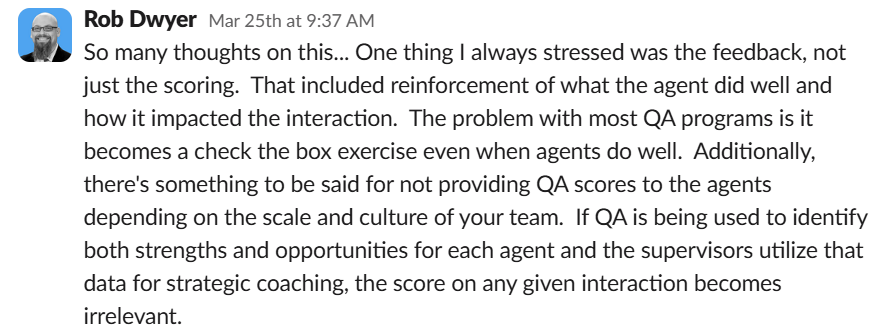By
Erica Marois
|
Date Published: April 03, 2025 - Last Updated April 03, 2025
|
Comments
In many contact centers, quality assurance (QA) teams play a crucial role in maintaining service excellence. However, it's not uncommon for frontline agents to view QA as the "bad guys." If this challenge sounds familiar, you're not alone. We recently asked our ICMI Top 25 Thought Leaders for their best advice on shifting this perception and they delivered some fantastic insights!

1. Ensure Your QA Program is Fair and Meaningful
Jeremy Hyde raised an important question: Is your quality program overly nitpicky? Agents may feel frustrated if they are penalized for minor details. Take a step back and evaluate whether your scoring criteria truly reflect what's important for the customer experience AND the agent's success.

2. Foster Two-Way Conversations
Agents are more likely to trust the QA process if they have a voice in it. Jeremy also emphasized the importance of allowing agents to challenge evaluations they disagree with. If agents see QA as a rigid one-way assessment with no opportunity for dialogue, it creates an adversarial dynamic. Instead, encourage open discussions and give agents a platform to share their perspectives.
3. Keep QA Grounded in Reality
Both Jeremy and Jake Shields recommended that QA evaluators take live calls on a regular basis. By doing so, evaluators stay connected to agents' day-to-day challenges, ensuring a more empathetic and realistic approach to quality assessments. When QA understands the realities of the job firsthand, their feedback carries more credibility.
4. Involve Agents in the QA Process
Giving agents more ownership over quality discussions is a powerful way to build trust. Jake shared two impactful strategies:
- Self-evaluations: Have agents review their own calls alongside QA evaluators quarterly. This fosters an understanding of the QA criteria and opens up a dialogue about the process itself.
- QA Form Reviews: Gather a small team of agents to review the QA form bi-annually, providing feedback on what's working and what could be improved. Rotating participation ensures diverse perspectives and continuous improvement.
5. Shift the Focus from Scores to Feedback
Rob Dwyer pointed out that too many QA programs become a "check-the-box" exercise. If agents only see QA as a number attached to their performance, they may feel demotivated or defensive. Instead, prioritize constructive feedback that highlights strengths as well as opportunities for improvement. Some teams have even removed QA scores, focusing instead on coaching conversations that drive long-term development.

6. Leverage AI Thoughtfully
Jeremy also noted that AI-driven QA has the potential to reshape the function entirely — if implemented correctly. Rather than simply automating existing processes, leaders should rethink how AI can enhance coaching, remove bias and support evaluators and agents in delivering better customer experiences.
7. Build a Culture of Radical Candor
Nate Brown highlighted Kim Scott's Radical Candor framework: "Care personally so that you can challenge directly." QA teams need to be deeply connected to the organization's mission and invested in agent success. When agents feel genuinely supported, they're far more likely to embrace feedback as a tool for growth rather than as a punitive measure.
Final Thoughts
The key to transforming QA's reputation is shifting from a policing mindset to a partnership approach. By making QA more collaborative, transparent and empathetic, contact centers can create a culture where agents see evaluators not as adversaries, but as valuable coaches invested in their success.
What has worked for your team in changing the perception of QA? We'd love to hear your thoughts!